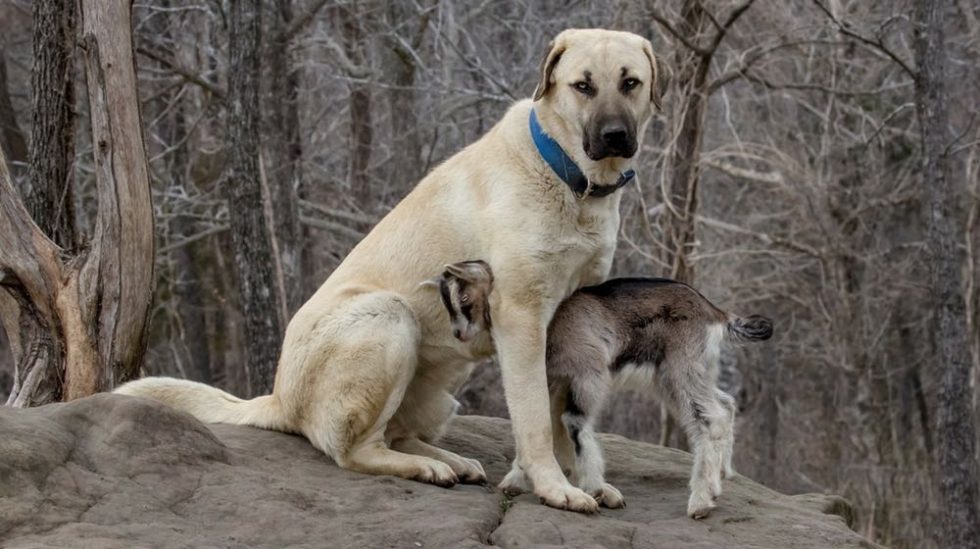The Anatolian Shepherd Dog is a large breed known for its ancient lineage and it’s one of the best guard dogs, strong, independent, and lover of a practical lifestyle.
The Anatolian Shepherd Dog can be quite introverted, and they often prefer to do their business without anyone’s direction or interference. They can make excellent pets, but experts advise that they begin mixing with both humans and other animals early in life and provide socialization from a young age.
The Anatolian Dog without proper socialization can easily become aggressive and thus pose a danger to the lives of people and animals. Because of their intelligence, you may find it difficult to train this breed, but they are often obedient dogs who are loyal to the needs of their companions.
History of the Anatolian Shepherd Dog
The Anatolian Shepherd Dog is an ancient guard dog breed with a long history. Perhaps the origins of this dog can be traced back to the Tibetan Drake dogs and Roman Molossia warriors that came to Turkey more than 4000 years ago. And they have proven invaluable by guarding and defending livestock against other predators, including wolves and bears. They have accompanied nomadic shepherds and have become spread over a large geographic range, which is why Anatolian Terriers are so different in size, coat type, and color. But many traits remained constant in each breed, such as loyalty, independence, and strength.
The shepherd’s name is a misnomer because the breed was never used as a shepherd. The Turkish name for this breed, kuban kopje, means shepherd dog. There is disagreement as to whether the Anatolian is a separate breed from the Kangal (or Karabash) dog.
The first breed did not come to America until the 1950s, and although it proved to be an effective and excellent keeper of livestock against wolves and other predators, it remained relatively unknown. Only in the late 1970s and 1980s did the Anatolian Shepherd Dog begin to be widely appreciated, and its utilitarian, rather than cosmetic, traits are still valued. Pet owners who wished a loyal and effective guardian began to have the breed. In 1996, the Anatolian Shepherd was accepted into the AKC working group, and they still have strong working instincts above all. Anatolia is used to preserve leopards in Africa by protecting livestock from leopards.

Characteristics of the Anatolian Shepherd dog
The Anatolian Shepherd Dog “Karabash” or Turkish guard dog is originally from Kangal Sivas, Turkey; it is a short breed with a thick undercoat, and occasional feathers around the tail, legs and ears. It’s white, brindle, red, but the most common is some variety of coloring with a black muzzle and its nose is mostly dark in color and be black or dark brown, clear. Its height vary between 67.5 and 72.5 cm; and the weight vary between 37 and 55 kg for females; and between 50 to 68 kg for males.
The Anatolian Shepherd Dog is very serious in his actions, devoted to his family and his duty as a protector and guard of the family. At the same time, he is considered a quiet dog, and he does not try to cause you problems. They are suspicious of strangers and do not like being away from the vicinity of the house. While she is good with children, but she may not be playful enough to satisfy the wishes of the children. As a vigilant and cautious watchdog, this dog tends to bark a lot when doubts arise.

Health of the Anatolian Shepherd Dog
Common health problems
The Anatolian Shepherd Dog is one of the largest dog breeds in the world , and therefore, they face a number of health problems common to other large and giant breeds. Among the problems most often found with the Anatolian Shepherd:
- Elbow dysplasia.
- Hip joint deformities.
- Demodectic mange.
- Hypothyroidism.
- Immunity issues.
- Prone to hypothyroidism or ectropion.
Diet and nutrition
Proper nutrition is recommended with all dog breeds, including a high-quality, high-protein diet. Anatolian Shepherds do not tend to overeat, although feeding should take place on a schedule. The nutritional needs of an Anatolian Shepherd Dog will vary depending on their activity level and age, with older and / or more sedentary dogs requiring fewer daily calories.
Anatolian Shepherd Dog Exercises
The Anatolian Shepherd Dog needs the opportunity to exercise every day, either through long walks or brisk jogging, and he needs to communicate with his family.
This strain needs a lot of exercise, especially in open places such as the yard, and it needs to walk long distances. Or running quickly, and it is very important to train the dog early because he is a stubborn and dominant dog.
Basic care for this dog is relatively easy. Because it has a short, dense coat with a thick undercoat, you will only need to brush it once a week to get rid of dead hair. And their hair will fall out hard during the seasons of hair loss.


